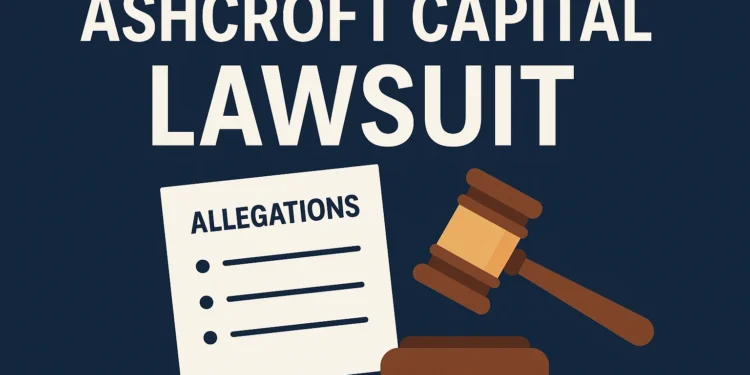The real estate investment sector has seen immense growth in the past decade, with firms like Ashcroft Capital emerging as key players in multifamily property investments. However, with rapid expansion comes scrutiny, and the recent discussions surrounding the Ashcroft Capital lawsuit have brought attention to the complexities of real estate syndications, investor relations, and compliance matters.
This article will provide an in-depth look at the situation, including who Ashcroft Capital is, why lawsuits in the investment sector arise, what details are known about the Ashcroft Capital case, and what potential implications it holds for investors and the broader real estate community.
Contents
- 1 Who is Ashcroft Capital?
- 2 Why Do Lawsuits Happen in Real Estate Investment?
- 3 The Ashcroft Capital Lawsuit Explained
- 4 Investor Concerns in the Case
- 5 How Ashcroft Capital Responded
- 6 Lessons for Real Estate Investors
- 7 Broader Implications for the Real Estate Industry
- 8 Similar Lawsuits in Real Estate Syndication
- 9 How Investors Can Protect Themselves
- 10 The Future of Ashcroft Capital
- 11 Conclusion
Who is Ashcroft Capital?
Ashcroft Capital is a real estate investment firm co-founded by Joe Fairless and Frank Roessler. The company specializes in acquiring, managing, and repositioning multifamily apartment communities across the United States. Since its inception, Ashcroft has earned a reputation as one of the more aggressive and innovative syndication companies, attracting both accredited and non-accredited investors.
Some key highlights of the firm include:
-
Focus on value-add multifamily properties: The firm acquires apartment complexes that need improvements, renovates them, and increases rental income.
-
Investor syndications: Investors pool their funds to purchase larger assets, sharing both profits and risks.
-
Nationwide presence: With properties across states such as Texas, Georgia, Florida, and North Carolina, Ashcroft Capital has built a strong portfolio.
Given its size and prominence, any Ashcroft Capital lawsuit inevitably sparks attention in the real estate and financial communities.
Why Do Lawsuits Happen in Real Estate Investment?
Before diving into the specifics of the Ashcroft case, it’s essential to understand why lawsuits arise in the investment sector.

Investor Expectations vs. Market Realities
One of the most common causes of disputes is the difference between what investors expect and what actually happens. Market fluctuations, property vacancies, or mismanagement can lead to losses and, ultimately, lawsuits.
Regulatory and Compliance Issues
Investment firms must adhere to strict regulations under the SEC (Securities and Exchange Commission). Any violation, whether intentional or accidental, can lead to legal action.
Breach of Fiduciary Duty
Fund managers have a fiduciary responsibility to act in the best interest of their investors. If investors feel that their funds have been misused or decisions have been made that do not serve their interests, lawsuits may follow.
Contractual Disputes
Real estate transactions involve detailed contracts. Disagreements about contract terms, profit distribution, or exit strategies can result in litigation.
The Ashcroft Capital Lawsuit Explained
The Ashcroft Capital lawsuit revolves around investor concerns regarding the management and performance of certain multifamily properties. While full details are not always made public due to ongoing proceedings or confidentiality agreements, reports indicate that some investors have raised issues related to:
-
Transparency in reporting property performance.
-
Allocation and use of investor funds.
-
Decision-making authority in property acquisitions and sales.
-
Return on investment expectations versus actual distributions.
Like many lawsuits in the investment sector, the dispute seems rooted in balancing investor expectations with the realities of large-scale property management.
Investor Concerns in the Case
The Ashcroft lawsuit highlights the common issues that investors face when participating in syndication deals.
Transparency and Communication
Many investors want clear, timely updates on how their money is being used. When communication breaks down, trust erodes, leading to legal action.
Financial Performance
If projected returns are not met, especially in a volatile market, investors may suspect mismanagement or misrepresentation of initial projections.
Exit Strategies
Some lawsuits stem from disagreements over when and how properties should be sold. Investors may feel trapped in long-term deals with no clear exit.
How Ashcroft Capital Responded
In situations like this, firms typically defend their strategies and actions by citing:
-
Market downturns (such as rising interest rates, inflation, or pandemic-related challenges).
-
Regulatory compliance records showing no intentional wrongdoing.
-
Long-term investment strategies that require patience rather than short-term gains.
While official responses vary, Ashcroft Capital has maintained its commitment to investors and continues to operate within the multifamily real estate market.
Lessons for Real Estate Investors
The Ashcroft Capital lawsuit offers important takeaways for current and prospective investors:
1. Do Thorough Due Diligence
Before investing, research the company’s track record, management team, and portfolio performance. Look beyond marketing material and analyze actual property performance.
2. Understand Risk Factors
All investments carry risk. Market downturns, higher interest rates, or property management challenges can impact returns. Investors should never assume guaranteed profits.
3. Review Contracts Carefully
Read all agreements thoroughly, including profit distribution schedules, exit clauses, and management fees. Consult with a legal professional if needed.
4. Stay Informed and Engaged
Investors should remain proactive by requesting updates, attending webinars, and reviewing quarterly reports. Open communication with fund managers helps avoid misunderstandings.
5. Diversify Investments
Placing all capital into one firm or property is risky. Diversifying across multiple firms or asset classes reduces exposure to potential losses.
Broader Implications for the Real Estate Industry
The Ashcroft case is not an isolated incident. It reflects a broader trend in real estate investment:
-
Increased scrutiny of syndication firms: As more retail investors enter syndications, firms face heightened accountability.
-
Regulatory oversight: The SEC continues to watch closely, ensuring firms comply with securities laws.
-
Market volatility challenges: With interest rates rising and property values fluctuating, many investment firms face financial pressure, which can lead to disputes.
Similar Lawsuits in Real Estate Syndication
The Ashcroft case mirrors issues seen in other real estate syndication lawsuits. Common themes include:
-
Overpromised returns not materializing.
-
Lack of transparency in financial reporting.
-
Investor dissatisfaction with property management decisions.
These cases emphasize the importance of realistic projections, open communication, and ethical leadership.
How Investors Can Protect Themselves
Investors concerned about avoiding similar situations should adopt strategies to safeguard their capital:
-
Request Audited Financial Statements: Ensure numbers are verified by third parties.
-
Join Investor Forums: Networking with other investors can reveal insights about a company’s track record.
-
Understand Market Trends: Stay updated on real estate cycles to contextualize investment performance.
-
Legal Safeguards: Work with an attorney to review contracts before signing.
The Future of Ashcroft Capital
Despite the Ashcroft Capital lawsuit, the company continues to operate, pursue acquisitions, and manage its portfolio. Its ability to weather this challenge will depend on:
-
How effectively it addresses investor concerns.
-
Whether it implements stronger communication and transparency measures.
-
Its resilience in navigating economic headwinds in the multifamily market.
Conclusion
The Ashcroft Capital lawsuit underscores the importance of transparency, trust, and accountability in real estate investing. While lawsuits in the sector are not uncommon, they provide valuable lessons for both investors and investment firms.
For investors, the key takeaway is to conduct due diligence, understand the inherent risks of syndications, and maintain open communication with fund managers. For companies, the lesson is clear: investor trust must be earned and safeguarded through transparency, honesty, and sound financial management.
In the end, the Ashcroft Capital case serves as a reminder that real estate investing, while potentially lucrative, requires caution, awareness, and a commitment to long-term strategies.































